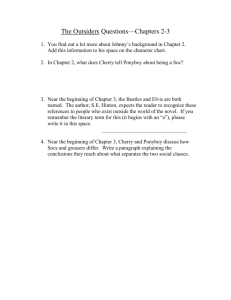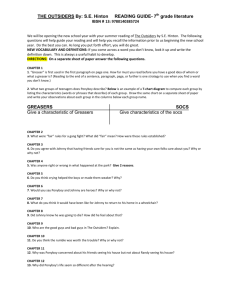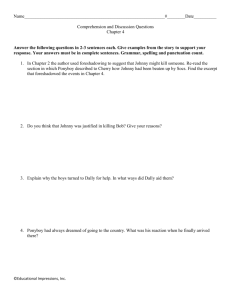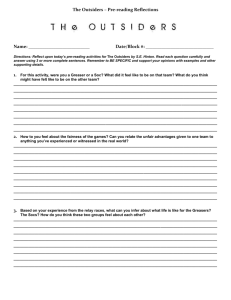Socratic Seminar The Outsiders
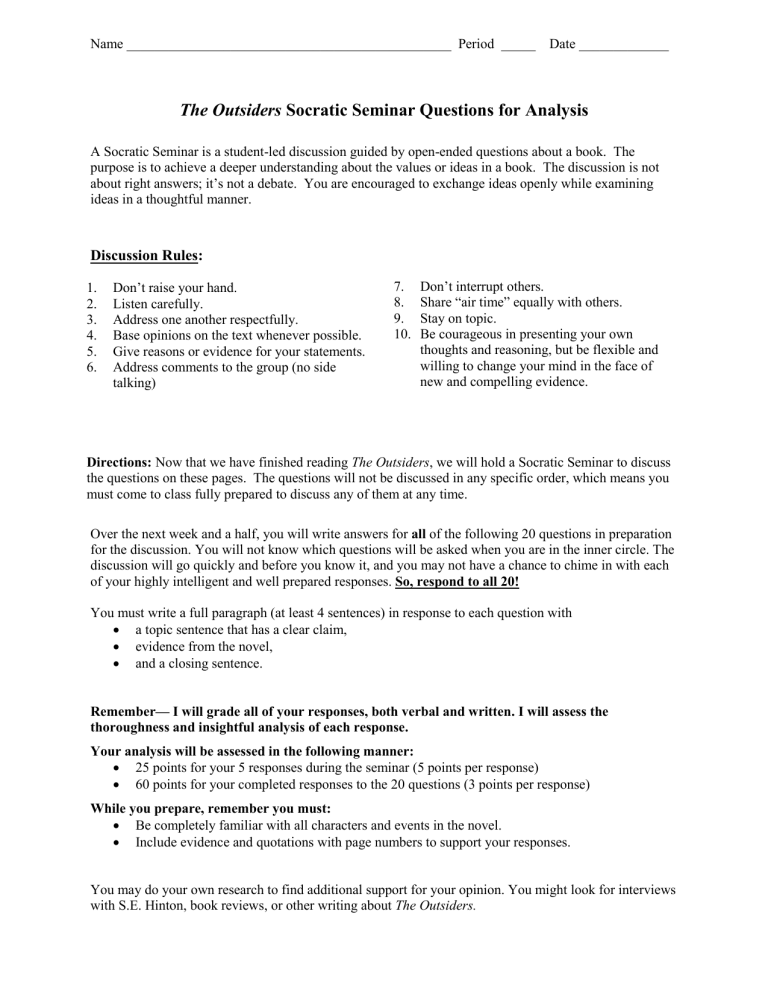
Name _______________________________________________ Period _____ Date _____________
The Outsiders Socratic Seminar Questions for Analysis
A Socratic Seminar is a student-led discussion guided by open-ended questions about a book. The purpose is to achieve a deeper understanding about the values or ideas in a book. The discussion is not about right answers; it’s not a debate. You are encouraged to exchange ideas openly while examining ideas in a thoughtful manner.
Discussion Rules:
1.
Don’t raise your hand.
2.
Listen carefully.
3.
Address one another respectfully.
4.
Base opinions on the text whenever possible.
5.
Give reasons or evidence for your statements.
6.
Address comments to the group (no side talking)
7.
8.
9.
10.
Don’t interrupt others.
Share “air time” equally with others.
Stay on topic.
Be courageous in presenting your own thoughts and reasoning, but be flexible and willing to change your mind in the face of new and compelling evidence.
Directions: Now that we have finished reading The Outsiders , we will hold a Socratic Seminar to discuss the questions on these pages. The questions will not be discussed in any specific order, which means you must come to class fully prepared to discuss any of them at any time.
Over the next week and a half, you will write answers for all of the following 20 questions in preparation for the discussion. You will not know which questions will be asked when you are in the inner circle. The discussion will go quickly and before you know it, and you may not have a chance to chime in with each of your highly intelligent and well prepared responses. So, respond to all 20!
You must write a full paragraph (at least 4 sentences) in response to each question with
a topic sentence that has a clear claim,
evidence from the novel,
and a closing sentence.
Remember— I will grade all of your responses, both verbal and written. I will assess the thoroughness and insightful analysis of each response.
Your analysis will be assessed in the following manner:
25 points for your 5 responses during the seminar (5 points per response)
60 points for your completed responses to the 20 questions (3 points per response)
While you prepare, remember you must:
Be completely familiar with all characters and events in the novel.
Include evidence and quotations with page numbers to support your responses.
You may do your own research to find additional support for your opinion. You might look for interviews with S.E. Hinton, book reviews, or other writing about The Outsiders.
S.E. Hinton’s view of the novel
1.
S.E. Hinton said, “When I write, an interesting transformation takes place. I go from thinking about my narrator to being him. A lot of Ponyboy's thoughts are my thoughts. He's probably the closest I've come to putting myself into a character.” Keeping this in mind, do you think that S.E. Hinton felt optimistic or pessimistic about the lives of teenagers in her community at the time she wrote the novel?
2.
S.E. Hinton wrote The Outsiders when she was only 15. In an interview, she said, “Every teenager feels that adults have no idea what's going on. That's exactly the way I felt when I wrote The
Outsiders . Even today, the concept of the in-group and the out-group remains the same. The uniforms change, and the names of the groups change, but kids really grasp how similar their situations are to
Ponyboy's.” Do you think this is true? In your answer, describe a situation today, either your own experience or the experience of someone you know, that is either similar to or different from a situation one of the characters faced in The Outsiders .
3.
The Outsiders was the first novel that publishers marketed specifically to young adult readers. Before
The Outsiders was published, books were either intended for children or adults. What is it about The
Outsiders that makes it appeal to teenage readers?
Class and societal expectations:
4.
Social class affects all of us. How does social class dictate characters’ behavior in The Outsiders ? If one of the characters switched to a different social status, would it fundamentally change that character? How? Name your character clearly and support your response with examples from the text.
5.
S.E. Hinton said, “When I was in high school, the genders were so separate from each other. If you weren't "dating" somebody, you couldn't just be friends with somebody. I'm really glad to see less rigidity in the gender structure [today]. I grew up with my cousins who were as close as brothers, and frankly I didn't like what girls were expected to do. I liked horseback riding, playing football, going to rodeos. I wanted to be in jeans all the time, and I couldn't figure out why I was supposed to conform to a certain standard, so I didn't.” What are some of the gender expectations in the novel?
Are these the same or different from today? How?
6.
Because of their life circumstances, many characters in the novel have lost their innocence. Which character is the best example of someone who has lost his/her innocence?
7.
The environment in which we grow up affects us all: family, friends, financial circumstances, school, and events around us that are beyond our control. In the novel, which character’s life was most affected by his/her environment?
8.
After the Socs attack Ponyboy at the beginning of the novel, he thinks, "I had just as much right to use the streets as the Socs did, and Johnny had never hurt them. Why did the Socs hate us so much?”
(16-17). Answer Ponyboy’s question. Why do the Socs hate the greasers so much?
Relationships within the novel:
9.
Which member of Ponyboy’s gang defies the Soc’s stereotype of a greaser in terms of the way he treats his friends?
10.
Ponyboy and Darry have a difficult relationship throughout the novel. How much does Ponyboy’s relationship with Darry impact his decisions, thoughts, and actions?
11.
Who are the outsiders in the novel? What does it mean to be an “outsider” in this text? Support your response with multiple examples from the text, and be sure to consider all characters, both greasers and Socs.
Quotations from the novel:
12.
Explain the meaning of Robert Frost’s poem “Nothing Gold Can Stay” (p. 77) in relation to the novel.
13.
Pony thinks “…in his hard face there was character, pride, and a savage defiance of the world…It would be a miracle if Dally loved anything. The fight for self-preservation has hardened him beyond caring” (59). Yet when Dally visits Pony and Johnny in Windrixville, Pony hears a different side of
Dally. “ ‘Johnny,’ Dally said in a pleading, high voice, ‘…I just don’t want you to get hurt. You don’t know what a few months in jail can do to you…you get hardened in jail. I don’t want that to happen to you. Like it happened to me…’ ” (89-90) What do these quotes reveal about Dally’s character? Which side of Dally do you think is more important?
14.
After the rumble, Dally told Pony “…you get tough like me and you don’t get hurt. You look out for yourself and nothin’ can touch you…” (147) Did Dally believe what he was saying?
15.
In his note to Pony, Johnny wrote “I don’t mind dying now. It’s worth it. It’s worth saving those kids.
Their lives are worth more than mine, they have more to live for” (178). Do you think Pony agreed with him about the value of their lives?
16.
When Johnny was in the hospital, Pony thinks “We needed Johnny as much as he needed the gang.
And for the same reason” (121). Which gang member needed Johnny the most?
Individual Characters
17. Everyday heroes surround us. These people sacrifice themselves sometimes for the sake of just one other person and sometimes for the sake of society as a whole. The heroic acts of these everyday heroes sometimes seem insignificant, like smiling at someone who is having a bad day. Other times they are grand, like saving someone from dangerous situation. The common thread in all of these actions is a hero’s willingness to put someone else before herself or himself. Through this, they change the world. Which character in The Outsiders is the most heroic? Why?
18. As a teen, S.E. Hinton used to tell herself, “It gets better.” She thought that being a teenager was incredibly difficult, but it does get better. It is a rough time of life, but she had family to help her get through the difficult times. The characters in the novel didn’t have adults in their families or people in their lives to remind them that things would get better. Which character’s life would have been changed the most if someone could have told him/her “It gets better?”
19. Adults are largely absent in The Outsiders. The gang members – greasers, hoods, and Socs – function as both friends and family to the boys and girls in the novel. Which character displays the greatest sense of loyalty?
20. All the characters in the novel display qualities of good friends. Which character would you most want as a friend? Why?
What can I do in a seminar? o Propose questions (“Sara’s and Alan’s debate makes me wonder about…”) o Propose answers (“I think the answer to Gerry’s question is right here on page…”) o Propose interpretations (“We’ve been talking as those the two characters never met before. But if we assume they already knew each other, and then re-read their conversation…”) o Propose a new way to discuss (“I think we are all remembering it differently. We should try not making any more comments until we’ve all taken a moment to re-read pages 4 and 5.”) o Propose connections (“This reminds me of that something we read back in
October…”) o Show the group outside evidence that you brought in to share (“I looked up the author last night and found this interview. Here’s a copy I printed out. It turns out that she also had a friend who was jumped by someone when he left a movie, just because he was a greaser…”) o Ask someone else to clarify what they already said or ask someone for more information (“Marcia, I don’t understand why you think that part is so important. Can you explain your evidence again for why you think that the ghost is all in her head?”) o Pause to re-read the text, hunting for a clue or generating a new idea
(Short pauses and even long silences are a good sign in a Socratic
Seminar…)
